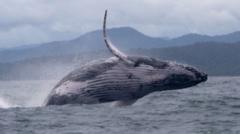A humpback whale's record-setting migration from Colombia to Zanzibar has sparked concern among scientists regarding the potential impact of climate change on whale behavior and food supply.
Humpback Whale Sets Record with Overseas Migration, Experts Warn of Climate Impact

Humpback Whale Sets Record with Overseas Migration, Experts Warn of Climate Impact
Scientists are astonished as a humpback whale completes an unprecedented migration of over 13,000 km, highlighting potential climate change consequences.
In a remarkable display of endurance, a humpback whale has become the subject of scientific amazement after completing one of the longest migrations ever documented. Spanning an astonishing minimum distance of 13,000 kilometers, this incredible journey—originally spotted off the Pacific coast of Colombia in 2017 and later identified near Zanzibar in the Indian Ocean in 2022—has raised questions about the effects of climate change on marine life, particularly for this highly migratory species.
Experts believe that the drastic journey may be attributed to evolving environmental conditions, particularly the depletion of food sources such as the krill that humpback whales depend on. Ekaterina Kalashnikova from the Tanzania Cetaceans Program remarked that this feat is "truly impressive and unusual," even for an animal known for its extensive migrations. The whale not only covered an extraordinary distance but potentially traversed two distinct breeding grounds during its voyage.
Recent research suggests that climate change might be significantly impacting food availability, forcing marine animals like humpback whales to venture further in search of nourishment. Dr. Kalashnikova mentioned that there's a possibility of addressing global changes in climate, increased frequency of extreme weather events, and evolutionary adaptations as additional factors influencing this migratory behavior.
The whale in question was part of a group initially documented in photographs taken in Colombia in 2013 and re-identified in the years following. The journey between these geographical points—Calibrated using great-circle distance measurements—offers insights into the migratory patterns of the species. The analysis drawing these conclusions utilized data from the citizen science platform happywhale.com, where researchers and enthusiasts have contributed countless images of individual whales, allowing for tracking and mapping through artificial intelligence based on tail patterns and shapes.
The implications of this study, published in the journal Royal Society Open Science, highlight not only the remarkable resilience of whales but also underscore the urgent need for conservation efforts to protect their habitats from the ongoing impacts of climate change.
Experts believe that the drastic journey may be attributed to evolving environmental conditions, particularly the depletion of food sources such as the krill that humpback whales depend on. Ekaterina Kalashnikova from the Tanzania Cetaceans Program remarked that this feat is "truly impressive and unusual," even for an animal known for its extensive migrations. The whale not only covered an extraordinary distance but potentially traversed two distinct breeding grounds during its voyage.
Recent research suggests that climate change might be significantly impacting food availability, forcing marine animals like humpback whales to venture further in search of nourishment. Dr. Kalashnikova mentioned that there's a possibility of addressing global changes in climate, increased frequency of extreme weather events, and evolutionary adaptations as additional factors influencing this migratory behavior.
The whale in question was part of a group initially documented in photographs taken in Colombia in 2013 and re-identified in the years following. The journey between these geographical points—Calibrated using great-circle distance measurements—offers insights into the migratory patterns of the species. The analysis drawing these conclusions utilized data from the citizen science platform happywhale.com, where researchers and enthusiasts have contributed countless images of individual whales, allowing for tracking and mapping through artificial intelligence based on tail patterns and shapes.
The implications of this study, published in the journal Royal Society Open Science, highlight not only the remarkable resilience of whales but also underscore the urgent need for conservation efforts to protect their habitats from the ongoing impacts of climate change.



















